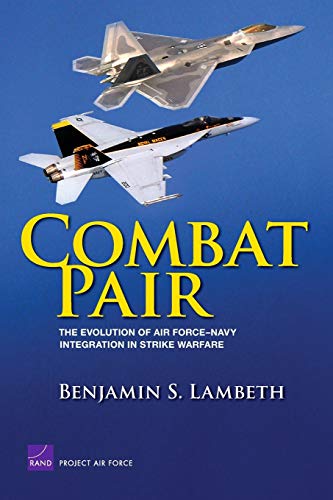
Combat Pair
by Benjamin S. Lambeth
"The Evolution of Air Force-Navy Integration in Strike Warfare"
Popularity
1.88 / 5
* A book's popularity is determined by how it compares to all other books on this website.
Where to buy?
Buy from Amazon* If you buy this book through the link above, we may receive a small commission at no extra cost to you.
Combat Pair by Benjamin S. Lambeth
Details
True Story:
Yes
Biography:
No
Page Count:
129
Published Date:
2007
ISBN13:
9780833042095
Description
Brief Summary
Combat Pair by Benjamin S. Lambeth provides an insightful analysis of the evolving cooperation between the U.S. Air Force and the U.S. Navy in the context of aerial strike operations. The book tracks the development of integration between these two military branches from the Vietnam War era, where cooperation was minimal, through to more contemporary times, where they exhibit a highly coordinated and collaborative approach. Lambeth's work highlights the significant shifts in military strategy that were prompted by the changing geopolitical landscape, particularly following the Cold War, and examines how the challenges of modern joint air operations have been addressed through improved interoperability.
Main Themes and Topics
One of the central themes of Combat Pair is the transformation of the U.S. military's approach to joint operations in aerial warfare. Lambeth meticulously explores how the once separate and distinct operating cultures of the Air Force and Navy evolved, driven by an urgent need to adapt to new global military challenges and to overcome the inefficiencies observed during operations such as the Gulf War against Iraq in 1991. The author delves into the processes and strategic shifts that facilitated the integration of these services, emphasizing the role of technology, mutual recognition of operational necessities, and the strategic pivot from a Soviet-centric focus to a more diversified threat environment.
Writing Style and Tone
Benjamin S. Lambeth's writing style in Combat Pair is analytical and detailed, reflecting his expertise in military aviation and strategy. The tone is scholarly and objective, providing a well-researched narrative that is rich with historical context and strategic analysis. Lambeth effectively balances technical details with broader strategic insights, making the book accessible not only to military professionals and scholars but also to general readers interested in military history and strategy.
Criticism
While Combat Pair is praised for its thorough research and detailed analysis, some readers may find the dense military jargon and detailed operational descriptions challenging to navigate. The book's focus on strategic and operational elements might overshadow the human aspects of military integration, which could be of interest to readers looking for personal narratives or case studies. However, these criticisms are often balanced by the acknowledgment of the book's contributions to understanding military cooperation and strategy.









